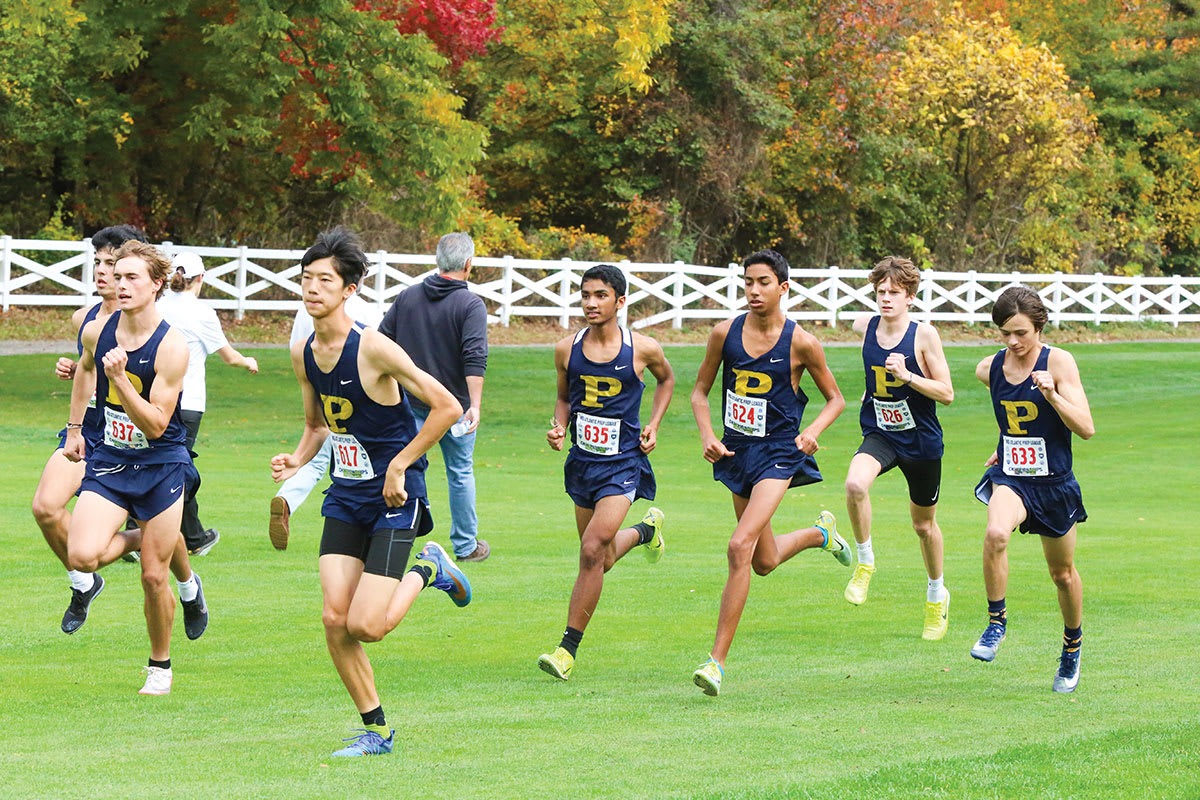Athletics
Beyond the finish line
Cross country may seem like a sport of individual feats, but the Falcons are a true team. The program, open to all interested students, offers life lessons for runners of all skill levels from coaches who also teach and mentor every step of the way.
“We have developed a program that welcomes runners of all abilities,” Director of Athletics Thad Lepcio said, “for the student who might struggle to run a mile when they first start to a MAPL individual champion.”
Varsity boys coach Grant Edwards works in college counseling and is an English and humanities teacher, and varsity girls coach Jesse Facey teaches Spanish. Assisting them are English teacher Emily Munch who serves as the girls assistant coach, and science teacher Josh Sham, who serves as boys assistant coach. The novice group is trained by Language Department Chair Jose Ruiz, Science Department Chair Jen Morgan, mathematics teacher Amandeep Kaur and Associate Head of School Catherine Rodrigue.
“Coaching is teaching, and teaching is coaching,” Edwards said. “When coaching, you’re teaching the same skills as in the classroom but using different methods and channels. The skills we instill in our team transcend sports, including discipline, consistency, accountability and the desire to improve.”
The program attracts a fair number of students who have never run before. Edwards said the novice coaches do a fantastic job working with new runners, gradually building endurance and consistency to avoid injuries.
“You don’t have to be a MAPL champion like Matilda Kardhashi ’25 to be consistent and to continually grow,” he said. “We had kids this year that dropped five to six minutes off their time from the beginning to the end of the season and others who went from novice to varsity runners.”

Rohan Nunugonda ’22 was a cross country captain. He ran in the 34-35 minute range in the 3.1-mile course during his freshman year and then dropped below 30 minutes as a sophomore. COVID-19 restrictions and canceled competitions in the fall of 2020 meant he didn’t get to race until the fall of 2021. But he would return for his senior year with a personal goal of breaking 30 minutes again, and he did just that.
“To see him do that, and more than anything else, to see the reaction of his peers, was amazing,” Edwards exclaimed. “He was a great mentor for a lot of the younger kids.”
During his time with the program, Nunugonda said that despite the bumpy road, he learned never to give up. He recalled a quote from a recently watched movie that reminded him of his Peddie cross country experience. “Success has no periods, only commas,” he said.
Over 50 students participated in the cross country program last season, making the team one of the largest since Edwards began coaching in 2017. With only four members graduating this spring, the coaches anticipate continued growth and success.
“The older runners on the team definitely played an important role in bringing those younger kids in, showing them this is what it means to be a part of this team and to put themselves out there,” Edwards said.
The girls’ team has gotten considerably stronger this year, and confidence is growing.
Edwards described the journey of Ananya Hari ’25, who ran with the novice training group most of last season. But on a number of occasions, she would run with the varsity training group because she was committed and very much invested.
“She’s always asking how she can improve and wants to be there to support her teammates, even if she can’t race, and she just has an abundantly-positive attitude,” Facey said.
Hari became more aware of her limits last year and pushed herself further, running all summer. She was invited to preseason, but after testing positive for COVID the evening before it began, she instead returned at the beginning of the school year, where she trained with the novice group and ran races with the varsity runners.
“I think it was really amazing to see both sides of the cross country team and meet students with varying skill levels,” Hari said. “Both teams equally motivated me to run faster and work harder and made me appreciate how many amazing racing opportunities I got.”
Edwards said that an essential part of developing a program is the understanding that you don’t have to be the fastest runner on the team to have an important place on it.
“Our core values of consistency, accountability and desire don’t really depend on how fast you are,” Edwards said. “If you’re willing to do the work and to try, you can be consistent, you can hold yourself accountable and be accountable to others and you can want to get better.”
“This year, we had a number of kids who were really leaning into those core team values, and we saw some of that hard work pay off,” Facey said. “Matilda [Kardhashi] put in the work consistently and had an amazing breakout season. It’s fun when the work actually equals the success because it doesn’t always. And there were plenty of examples of times when it didn’t. But I think seeing both models of that was really cool this year.”
The team is also learning life lessons, including gaining the mental and emotional strength it takes to persevere and persist. “It’s an individual sport, but you’ve got people around you who are helping and supporting you,” Edwards said. “All of that crosses over to life.”